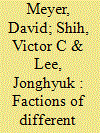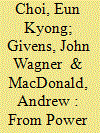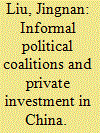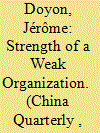| Srl | Item |
| 1 |
ID:
097446


|
|
|
| 2 |
ID:
145827


|
|
|
|
|
| Summary/Abstract |
The literature on faction suggests that patrons in the party may recruit faction members on the basis of a broad range of shared traits and experience. Some scholars argue reasonably that with increasing specialization of officials, factions are increasingly dominated by those with shared work experience in a set of bureaucracies. Although this trend may be true in general, senior leaders may still recruit those with whom they share birth place and school ties into their factions. To investigate this, we first derive four reasonable ways of measuring factional ties as suggested by the literature. We then explore the factional recruitment strategy pursued by each reform-era (1978–present) party secretary generals of the CCP by evaluating the measures of factional ties which predicted their clients’ promotions to full Central Committee membership. Our results show that Hu Yaobang, Jiang Zemin, and Xi Jinping pursued broadly based factional recruitment strategies, while Hu Jintao recruited faction members mainly from work colleagues. We further uncover signs that the party institutions may allow deposed secretary generals some measure of influence over promotions even after their political demise. At the same time, strict retirement rules on lower level officials gave rise to a cohort effect that gave the general secretary greater influence over the promotion of alternate Central Committee members to the full Central Committee during their first term than in subsequent terms.
|
|
|
|
|
|
|
|
|
|
|
|
|
|
|
|
| 3 |
ID:
183231


|
|
|
|
|
| Summary/Abstract |
Many China watchers argue that Xi Jinping has concentrated power in his own hands in a manner unprecedented since the death of Mao Zedong and Deng Xiaoping. This article tests the extent of Xi's power consolidation by comparing the strength of his faction during his time in power to similar periods under his two immediate predecessors, Jiang Zemin and Hu Jintao. Furthermore, we investigate whether a dominant faction is emerging under Xi Jinping, replacing the power balancing between factions that was the norm throughout the reform era. Analysing factional affiliations of Chinese leaders in the top four ranks, we find that Xi has formed a dominant faction. Through statistical analysis of the promotion chances of provincial leaders, we find that Xi has been unusually successful when compared to previous leaders at promoting his clients. This suggests that Xi has boosted the power of his faction by elevating provincial leaders to an extent not seen since the death of Mao and Deng.
|
|
|
|
|
|
|
|
|
|
|
|
|
|
|
|
| 4 |
ID:
182594


|
|
|
|
|
| Summary/Abstract |
This article attempts to estimate the effects of informal political coalitions on China's private investment. Theoretically, the party-state clients of China's supreme leaders are expected to have stronger incentives to foster economic growth. One way of doing so is to encourage private investment by reducing its political risks. Analysis of provincial-level panel data from 1993 to 2017 shows that personal connections—based on shared experience in the same work unit—between provincial leaders and the Chinese Communist Party's incumbent supreme leader significantly increase the growth rate of private investment. This suggests that informal institutional relations may assist the development of China's private economy by partially compensating for the weaknesses of formal rule-of-law institutions.
|
|
|
|
|
|
|
|
|
|
|
|
|
|
|
|
| 5 |
ID:
145826


|
|
|
|
|
| Summary/Abstract |
Informal connections play an important role in regimes all across the world, but among China's political elite, it is particularly factional affiliation that is said to structure contention over who will rule and who will fall victim to a purge. This article identifies two approaches to measuring factional ties in the literature: the exploratory approach traces alliance ties through qualitative assessment of insider sources, while the structured approach uses publicly available data to infer factions from shared characteristics. The article combines the two by arguing that informal politics is better conceptualized as a process of alliance formation shaped by an underlying social (network) structure. Among the structured approaches, coworker networks best capture the latter, but this can be further refined by noting the number of instances of working together, or by taking into account promotions that have occurred while the two individuals were coworkers.
|
|
|
|
|
|
|
|
|
|
|
|
|
|
|
|
| 6 |
ID:
175566


|
|
|
|
|
| Summary/Abstract |
How can a weak organization be a path to power? The Chinese Communist Youth League (CYL) lacks autonomy and coherence yet it is seen as the cradle for one of the main factions within the Chinese Communist Party (CCP). To understand this tension, I provide a novel account of the role played by the CYL in the recruitment of leading cadres since the 1980s. Against explanations based on factional struggles, I argue that the rise of CYL-affiliated cadres is a by-product of the organization's weakness. As the Party appoints CYL heads, CCP leaders, at various levels and at different points in time, have used the League to accelerate the promotion of their protégés. For years, there has been little incentive for Party bosses to dismantle this promotion path. However, in his bid to consolidate his power, Xi Jinping has weakened this channel so that it may not be used by potential rivals.
|
|
|
|
|
|
|
|
|
|
|
|
|
|
|
|